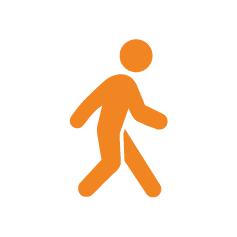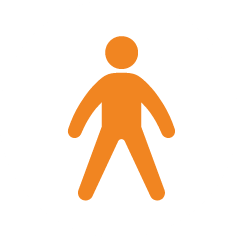
Healthy Aging Guide
Congratulations. You are part of the largest group of older Americans ever seen in our country. Indeed, 10,000 people turn 65 years old every day, and those aged 85 and older now make up the fastest growing demographic in the United States. 1
““Aging is not ‘lost youth’ but a new stage of opportunity and strength”
To some, it feels that this time of life is a time of endings. But it shouldn’t be. Because the more active you remain—both physically and mentally—the more successful this time of life will be. About the worst thing you could do is shut yourself off in your room and assume the best is over. In many ways, despite challenges, the best is yet to come.
Your goal should be healthy aging based on how you define healthy. For some women, that means playing tennis twice a week. For others, it means getting to church every Sunday and taking care of the grandkids. We know one woman who is thrilled with the active life she lives even though she is in a wheelchair. Meaning and purpose become the most important guide to a life of wellbeing.
So, before you dive into this article, take a few minutes and think about what successful aging means to you. Write it down and, once a year, take it out and review it. How close are you to meeting your goals? Is there anything you need to change?
Then follow the advice here—and listen to your doctors and other health care providers—to ensure that the next decades are as successful as can be.


Aging Well From Those Who Know
When researchers interviewed people aged 75 and older about what wellbeing meant to them, the responses could be divided into four main categories. 2 3
Physical/Environment
- “You’re able-bodied, you don’t have any health problems and do your own work and [handle] problems you have to deal with in your routine.”
- Physical and financial security and the sense that “mentally everything [is] going OK.”
- Physical independence, financial independence, autonomy and decision making and self-mastery
Lifestyle/Behavioral
- The ability to do things and be with people “Feeling well enough to do everything you wanted to do and being happy to get up in the morning,” or, at least, “being able to do some of the things that you used to.”
- Keeping up to date and learning new things
- Not being afraid of death, an easy death, a nice death, a painless death
Mind/Spirit
- A good mental perception of yourself and your environment and people and relationships around you
- Absence of dementia, feeling good (mentally), having a good memory, absence of depression or cognitive problems
- Self-acceptance and self-contentment and focusing on the present, accepting others, a positive outlook and a positive attitude, tolerance, coping and adaptation and adjustment
Social/Emotional
- Living in harmony, a rich life, a balanced life, a normal life, a happy life, living in peace
- Being surrounded by people and having company
- Doing things for the family (taking care of grandchildren or a partner), helping others, being a member of an organization, having social interactions and relationships with others
THE THREE INGREDIENTS FOR SUCCESSFUL AGING
Research finds three factors related to successful aging: maintaining your physical function, your cognitive function (eg, memory, decision-making, etc.) and continued involvement in social activities and productive pursuits. All are interdependent. For instance, the more involved you are in social activities, the better your overall health and cognition. 4
We examine these areas below. We used bone health as a marker for physical health since strong bones enable you to continue exercising, reduce your risk of falls (a major risk factor for death in older people) and allow you to remain involved with friends and your community.
Building and Maintaining Bone Health
Osteoporosis is called the “silent disease” because, like other silent diseases such as high blood pressure, osteoporosis has no initial symptoms. But, just like high blood pressure, it can kill you.
An estimated one in four women in the United States over age 65 has osteoporosis, in which bone breaks down faster than it builds, weakening the structure and increasing the risk of fracture. Indeed, a fracture, often of the hip or wrist, is often the first sign of osteoporosis. 5
In fact, more people are hospitalized for osteoporosis-related fractures than for heart attacks, stroke or breast cancer. And half of those fractures are hip fractures. 6 The scary thing is that about half of those who experience a hip fracture will die within a year. 7
Step one is learning if you have osteoporosis or are at risk of the disease. It’s easy enough to do with a special x-ray called a DXA scan, which is a type of bone density scan. Current guidelines call for screening in women aged 65 years or older and in younger women whose fracture risk is equal to or greater than that of a 65-year-old white woman with no additional risk factors. 8 If you are diagnosed with osteoporosis or its precursor, osteopenia, your doctor may recommend medications designed to prevent further bone loss or even help build bone.
Risk Factors for Osteoporosis 9
You have a higher risk of osteoporosis if you:
- Have a family history of broken bones or osteoporosis
- Broke a bone after age 50
- Had surgery to remove your ovaries before your periods stopped
- Had early menopause
- Have not gotten enough calcium and/or vitamin D throughout your life
- Had extended bed rest or were physically inactive at some point in
your life - Smoke (smokers may absorb less calcium from their diets)
- Take certain medications, including those that reduce stomach acid,
some antidepressants, antipsychotics, antiepileptics, thyroid replacement
therapy, high blood pressure drugs and blood thinners 10 - Used medicines such as corticosteroids for a long time
- Have a small body frame
However, there are numerous other things you can do to preserve and strengthen the bone you have and prevent fractures including:
Exercise. If your only exercise is walking around the block, then you’re doing your bones a disservice. Bones are like muscles: they need to be challenged in order to grow and strengthen. That’s why astronauts who spend time in zero gravity take medication to prevent bone loss. 11
When it comes to building bone, you need weight-bearing exercises that force you to work against gravity. While walking, climbing stairs, jogging, playing tennis, etc., can help slow bone loss, they don’t do anything to strengthen bone. For that, you need exercises in which you move against some kind of resistance, such as lifting weights. Even exercises using your own body weight as resistance, such as pushups and planks, can help.
Ideally, you should work with a trainer to develop a program designed to improve your bone density and strength, with the amount of weight increasing over time. 12
Tai Chi and Qi Gong
These ancient Asian practices can be thought of as meditative movement. They incorporate slow, graceful movements with deep breathing and are known for their ability to improve balance, motor function, functional mobility, step length and cognition. Practicing either can also reduce your risk of falls. 13 Check your local recreation department, YMCA or senior center for classes.
Strengthening the muscles around the bones is also important. For instance, strengthening your back muscles can reduce your risk of vertebral fractures (which leads to that hunched, stooping posture you see in many elderly women). 12
Eating for bone health. In an ideal world, you’ve been eating for bone health your entire life. In the real world, that’s probably not the case. However, as with most things, it’s never too late to start.
Numerous nutrients are key when it comes to building and maintaining bone strength. Two key ones are calcium and vitamin D. While there are plenty of foods high in calcium, it’s harder to get the vitamin D you need from food alone. And without vitamin D, you’re not getting all the benefits of calcium. The two work in sync, and each needs the other to provide their bone strengthening benefits.
The following table lists foods high in calcium.
Food sources of vitamin D include beef liver, cheese and egg yolks. Milk is fortified with vitamin D. If you supplement, current recommendations are for 600 IU a day for women aged 51 to 70, and 800 IU a day for those aged 71 and older. 14 Your doctor should also regularly test your blood levels of vitamin D to ensure you’re getting enough—but not too much. Most supplements are combined with vitamin K, another important vitamin for bone health.
Foods High in Calcium
[su_table responsive=”yes” class=”custom-su-table”]
| FRUITS AND VEGETABLES | SERVING SIZE | ESTIMATED CALCIUM* |
|---|---|---|
| Collard greens, frozen | 8 oz | 360 mg |
| Broccoli rabe | 8 oz | 200 mg |
| Kale, frozen | 8 oz | 360 mg |
| Soy beans, green, boiled | 8 oz | 175 mg |
| Bok choy, cooked, boiled | 8 oz | 160 mg |
| Figs, dried | 2 figs | 65 mg |
| Broccoli, fresh, cooked | 8 oz | 60 mg |
| Oranges | 1 whole | 55 mg |
| SEAFOOD | SERVING SIZE | ESTIMATED CALCIUM* |
| Sardines, canned with bones | 3 oz | 325 mg |
| Salmon, canned with bones | 3 oz | 180 mg |
| Shrimp, canned | 3 oz | 125 mg |
| DAIRY | SERVING SIZE | ESTIMATED CALCIUM* |
| Ricotta, part-skim | 4 oz | 335 mg |
| Yogurt, plain, low-fat | 6 oz | 310 mg |
| Milk, skim, low-fat, whole | 8 oz | 300 mg |
| Yogurt with fruit, low-fat | 6 oz | 260 mg |
| Mozzarella, part-skim | 1 oz | 210 mg |
| Cheddar | 1 oz | 205 mg |
| Yogurt, Greek | 6 oz | 200 mg |
| American cheese | 1 oz | 195 mg |
| Feta cheese | 4 oz | 140 mg |
| Cottage cheese, 2% | 4 oz | 105 mg |
| Frozen yogurt, vanilla | 8 oz | 105 mg |
| Ice cream, vanilla | 8 oz | 85 mg |
| Parmesan | 1 tbsp | 55 mg |
| FORTIFIED FOOD | SERVING SIZE | ESTIMATED CALCIUM* |
| Almond milk, rice milk or soy milk, fortified | 8 oz | 300 mg |
| Orange juice and other fruit juices, fortified | 8 oz | 300 mg |
| Tofu, prepared with calcium | 4 oz | 205 mg |
| Waffle, frozen, fortified | 2 pieces | 200 mg |
| Oatmeal, fortified | 1 packet | 140 mg |
| English muffin, fortified | 1 muffin | 100 mg |
| Cereal, fortified | 8 oz | 100-1,000 mg |
| OTHER | SERVING SIZE | ESTIMATED CALCIUM* |
| Mac & cheese, frozen | 1 package | 325 mg |
| Pizza, cheese, frozen | 1 serving | 115 mg |
| Pudding, chocolate, prepared with 2% milk | 4 oz | 160 mg |
| Beans, baked, canned | 4 oz | 160 mg |
[/su_table]
Preventing Falls
What’s the leading cause of injury-related deaths among those aged 65 and older? One word: Falls. More than one in four people aged 65 and older will fall every year, and nearly 30,000 will die as a result of that fall. 15 In one study, a third of those aged 60 and older who had a ground level fall, that is, they did not fall down the stairs or from the bed, died within three years. 16
There are numerous things you can do to prevent falls, the most important of which is to fall proof your home, where one in six falls occurs.
The National Institute of Aging recommends that you 17:
- Have handrails on both sides of the stairs. Make sure they’re tightly fastened and use them when you go up and down. If you must carry something while you’re on the stairs, hold it in one hand and use the handrail with the other. Don’t let what you’re carrying block your view of the steps.
- Install bright lighting with light switches at the top and bottom of stairs and on each end of a long hall and use them!
- Keep areas where you walk tidy. Don’t leave books, papers, clothes and shoes on the floor or stairs.
- Check that all carpets are fixed firmly to the floor so they won’t slip.
- Avoid throw rugs or small area rugs.
- Mount grab bars near toilets and on the inside and outside of your tub and shower.
- Place non-skid mats, strips, or carpet on all surfaces that may get wet.
- Turn on night lights.
- Keep a flashlight by your bed in case the power is out and you need to get up.
- Keep your phone near your bed.
- Keep electric cords and telephone wires near walls and away from walking paths.
- Arrange your furniture (especially low coffee tables) and other objects so they are not in your way when you walk.
- Use sofas and chairs that you can get in and out of easily.
- Use a special grabbing tool called a “reach stick” rather than standing on a chair or stepladder to reach something.
- Watch out for your dog or cat so you don’t trip over them.
- Keep emergency numbers on speed dial on your cell phone.
Staying Balanced:
Balance is key to preventing falls. Here are several exercises you can do to improve your balance. Caution: You might want to have someone in the room with you if you have a risk of falling. 18

Tightrope walk.
Place the heel of one foot against the toe of another as you walk across the room, keeping your arms out to the side and parallel to the floor and your eyes focused in front of you.
Single foot raise.
Stand with your arms out to the sides, parallel to the floor. Lift one leg until the thigh is parallel to the floor and try to hold the position for 10 seconds. Repeat on the other leg. Do this 5 times. Try to increase the time by a few seconds each day. If needed, start by holding onto a chair.

Standing up.
This sounds easy, but we’ve made it harder. Stand up from your chair without using your arms. Try that 10 times a day

Weight shifts.
Stand with your legs hip-width apart, then shift your weight to your right side so your left leg lifts off the floor. Hold for at least 15 seconds. Switch legs. Repeat 5 times on each leg. Try to increase the number of repetitions you do each day and the amount of time you hold your leg out.
There are a number of other lifestyle changes that, while not definitively proven and recommended by national organizations, none-the-less, may be useful for maintaining bone. An excellent summary can be found in the book Your Bones by Lara Pizzorno.
MAINTAINING MEMORY
You forgot where you put your keys, the name of that woman at the gym you see every day, what you needed when you walked from the kitchen to the bedroom. Is it Alzheimer’s disease? Some other form of dementia?
Don’t panic. While it’s true that the majority of people with dementia are older, forgetfulness and memory loss do not necessarily translate into Alzheimer’s disease. The table below from the Alzheimer’s Association highlights the differences.
[su_table responsive=”yes” class=”custom-su-table”]
| SIGNS OF ALZHEIMER’S DISEASE/DEMENTIA | TYPICAL AGE-RELATED CHANGES |
|---|---|
| Poor judgement and decision-making | Making a bad decision once in a while |
| Inability to manage a budget | Missing a monthly payment |
| Losing track of the date or the season | Forgetting which day it is and remembering later |
| Difficulty having a conversation | Sometimes forgetting which word to use |
| Misplacing things and being unable to retrace steps to find them | Losing things from time to time |
[/su_table]
Staying Sharp
There are currently no FDA-approved drugs for maintaining memory and cognition. That’s why it’s important to focus on lifestyle approaches and consider herbal and nutritional supplements. Here’s what the research shows:
Herbal Approaches
Herbal remedies have been used in China for more than 2,000 years to boost memory. 19 Some with the most evidence behind them include:
- Gingko biloba. Gingko is widely used for preventing and managing memory-related disorders. Studies suggest it reduces oxidative damage to cells as well as providing anti-inflammatory benefits, improving glucose uptake, blood flow, nitric oxide production and other processes that can contribute to healthier brain cells and, thus, reduce memory loss. 19 Several studies in healthy people find that ginkgo can improve cognitive function, including working memory. One study in people with vascular cognitive impairment (in which not enough blood gets to the brain), but not dementia, demonstrated similar findings. And several studies in people with various forms of dementia find significant improvements in many areas related to memory and cognition.19 Be careful if you are taking any blood thinners (eg, aspirin or Coumadin), as they may increase the risk of bleeding.
- Huperzia serrata. This herb reduces that amount of acetylcholinesterase in the brain, which is known to contribute to Alzheimer’s disease. It also has antioxidant and anti-inflammatory properties, and also acts upon important neurotransmitters related to cognition. Most studies have been conducted in people with Alzheimer’s disease. They demonstrate improvements in cognition, memory, behavior and overall function with few side effects. 19
- Turmeric. You probably know this herb as a spice, but it’s also used in numerous remedies in Asian medicine. Like all the herbal remedies mentioned here, it has strong antioxidant and anti-inflammatory properties. One study of 1,101 older people without dementia found that those with a high turmeric consumption had better cognitive function than those with lower consumption. However, studies in people with dementia don’t show much improvement. Still, it may be worth trying as a general anti-inflammatory agent and may help with osteoarthritis, too. 19
- Ginseng. Another popular herbal supplement for numerous conditions, ginseng can help improve learning and memory, potentially protecting against Alzheimer’s disease. 19 One reason could be its ability to protect against amyloid-β and cholinesterase activity, both of which are associated with the development of Alzheimer’s disease. Most clinical studies have been conducted on healthy people, however, not on those with Alzheimer’s disease, so its overall benefit is not known.
Whenever you take supplements, make sure you tell your doctor or other health care providers, as the supplements could interact with certain medications. Also be sure to purchase quality supplements from reputable brands. Look for the NSF International, US Pharmacopeia or Consumer Lab seal. These organizations verify what’s inside the product.
Are You at Risk for Dementia?
The greatest risk factor for Alzheimer’s disease and other dementias is age, followed by family history. You can’t control either of those, however, many other risk factors can be controlled, such as heart disease, diabetes, high cholesterol and high blood pressure. And the best way to control those risk factors is through lifestyle changes, including losing weight, reducing stress, eating healthy, quitting smoking and exercising regularly. 20
This is where the classic elements of a healthy lifestyle come into play: a diet high in healthy proteins, fruits and vegetables and low in saturated fat, sugar and processed foods; regular mental and physical exercise (preferably a combination of cardio and weight-bearing exercises) and stress management (meditation, yoga, deep breathing). Following your doctor’s instructions regarding medications is also important, as is maintaining a healthy weight. Finally, several of the herbal supplements recommended above may also help prevent or manage heart disease or stroke.
Another risk factor is depression, which can lead to chronic inflammation. It’s why people who are depressed often talk about feeling “foggy” and unable to concentrate. For instance, not only can yoga and exercise improve depression and mood, but there is also evidence they can lead to improvements in cognitive function, particularly attention, processing speed, executive function (decision-making) and memory in people with and without depression. 21
GET ALONG WITH THE HELP OF YOUR FRIENDS
One of the most important components to successful aging doesn’t come in a pill bottle, a grocery store or even the gym. It comes from your environment. Specifically, the ability to stay engaged in your community and with other people.
One study of 56,436 US women ages 55 to 72 found that after controlling for individual health behaviors like smoking, physical activity and weight, one of the most important elements to healthy aging was a woman’s social network, that is, having close friends and relatives. Women without a close friend had four-and-a-half times worse physical function and more than five times less vitality. In fact, the researchers found the effects of a poor social network were just as devasting to the woman’s health as being a heavy smoker or extremely obese. 22
If you already have a strong social network, good for you! If not, try the following:
- Volunteer. There is always an organization that needs you. Good resources include the Corporation for National and Community Service, Senior Corps’ Foster Grandparent or Senior Companions program and the AARP Foundation Experience Corp, which helps children improve their reading skills.
- Meet up with others. Meetup.com is an online site that lists thousands of groups all focused around a single passion. You can find groups in your area that do everything from hiking and birding, to knitting, to playing the ukulele. Or you can start your own group based on your own interests. Many groups are also age specific, so if you want to hang with your peers, you can do that, too.
- Start a new hobby. Always wanted to learn to play the piano? It’s never too late. How about learning a new language? Ballroom dancing? Becoming a master gardener? The possibilities are limitless.
- Join a small gym. Many of today’s gyms involve small facilities that nurture not only physical health, but a sense of community. These include your local YMCA, CrossFit, F45 and Orangetheory. All are accessible regardless of your age. Participating in this type of community-focused exercise means you can tackle all three of the elements of successful aging—physical health, cognitive strength and social interactions—at once!
CONCLUSION
The reality is that we’re all aging. And we’re only going in one direction—chronologically. That doesn’t have to mean we decline physically or mentally, however. If you embrace a healthy lifestyle, stay strong and maintain social connections, then these later years could be some of the best in your life.
REFERENCES
- US Census Bureau. A Snapshot of the Fast-Growing U.S. Older Population. 2018. Accessed October 11, 2019.
- Bryant LL, Corbett KK, Kutner JS. In their own words: a model of healthy aging. Soc Sci Med. 2001;53(7):927-941.
- Nosraty L, Jylha M, Raittila T, Lumme-Sandt K. Perceptions by the oldest old of successful aging, Vitality 90+ study. J Aging Stud. 2015;32:50-58.
- Cherry KE, Brown JS, Kim S, Jazwinski SM. Social factors and healthy aging: findings from the Louisiana Healthy Aging Study (LHAS). Kinesiol Rev (Champaign). 2016;5(1):50-56.
- Centers for Disease Control and Prevention. Osteoporosis. 2019. Accessed October 11, 2019.
- Singer A, Exuzides A, Spangler L, et al. Burden of illness for osteoporotic fractures compared with other serious
diseases among postmenopausal women in the United States. Mayo Clin Proc. 2015;90(1):53-62. - Bliuc D, Nguyen ND, Milch VE, Nguyen TV, Eisman JA, Center JR. Mortality risk associated with low-trauma osteoporotic fracture and subsequent fracture in men and women. JAMA. 2009;301(5):513-521.
- US Preventive Services Task Force, Curry SJ, Krist AH, et al. Screening for osteoporosis to prevent fractures: US Preventive Services Task Force recommendation statement. JAMA. 2018;319(24):2521-2531.
- National Institute on Aging. Osteoporosis. 2019. Accessed October 11, 2019.
- Panday K, Gona A, Humphrey MB. Medication-induced osteoporosis: screening and treatment strategies. Ther Adv Musculoskelet Dis. 2014;6(5):185-202.
- NASA. Preventing Bone Loss in Space Flight with Prophylactic Use of Bisphosphonate: Health Promotion of the Elderly by Space Medicine Technologies. 2012. Accessed October 11, 2019.
- Benedetti MG, Furlini G, Zati A, Letizia Mauro G. The effectiveness of physical exercise on bone density in osteoporotic patients. Biomed Res Int. 2018;2018:4840531.
- Rogers C, Larkey LK, Keller C. A review of clinical trials of tai chi and qigong in older adults. West J Nurs Res. 2008;31(2):245-279.
- National Institutes of Health: Office of Dietary Supplements. Vitamin D. 2019. Accessed October 11, 2019.
- Burns E, Kakara R. Deaths from falls among persons aged ≥65 Years – United States, 2007-2016. MMWR Morb Mortal Wkly Rep. 2018;67:509-514.
- Parker S, Afsharpad A. Ground-level geriatric falls: a not-so-minor mechanism of injury. Case Rep Orthop. 2014;2014:164632-164636.
- National Institute on Aging. Fall-Proofing Your Home. 2019. October 11, 2019.
- AgingInPlace. Top 10 Elderly Balance Exercises to Improve Balance and Coordination. 2019. Accessed October 11,
2019. - Chang D, Liu J, Bilinski K, et al. Herbal medicine for the treatment of vascular dementia: an overview of scientific evidence. Evid Based Complement Alternat Med. 2016;2016:7293626.
- Zhou X, Cui G, Tseng HH, et al. Vascular contributions to cognitive impairment and treatments with traditional
Chinese medicine. Evid Based Complement Alternat Med. 2016;2016:9627258. - Mathersul DC, Rosenbaum S. The roles of exercise and yoga in ameliorating depression as a risk factor for cognitive decline. Evid Based Complement Alternat Med. 2016;2016:4612953.
- Michael YL, Colditz GA, Coakley E, Kawachi I. Health behaviors, social networks, and healthy aging: cross sectional evidence from the Nurses’ Health Study. Qual Life Res. 1999;8(8):711-722.
RECOMMENDED READING
Your Bones: How You Can Prevent Osteoporosis & Have Strong Bones for Life Naturally by Lara Pizzorno
ABOUT THE AUTHORS
DR. WAYNE JONAS
Dr. Jonas is a practicing family physician, an expert in integrative health and whole person care delivery, and a widely published scientific investigator. Dr. Jonas is the president of Healing Works Foundation. Additionally, Dr. Jonas is a retired lieutenant colonel in the Medical Corps of the United States Army.
Dr. Jonas was the director of the Office of Alternative Medicine at the National Institutes of Health (NIH) from 1995-1999, and prior to that served as the Director of the Medical Research Fellowship at the Walter Reed Army Institute of Research. He is a Fellow of the American Academy of Family Physicians.
His research has appeared in peer-reviewed journals, such as the Journal of the American Medical Association, Nature Medicine, Journal of Family Practice, Annals of Internal Medicine, and The Lancet. Dr. Jonas received the 2015 Pioneer Award from the Integrative Healthcare Symposium, the 2007 America’s Top Family Doctors Award, the 2003 Pioneer Award from the American Holistic Medical Association, the 2002 Physician Recognition Award of the American Medical Association, and the 2002 Meritorious Activity Prize from the International Society of Life Information Science in Chiba, Japan.
Debra Gordon, MS
Debra Gordon, MS is a seasoned health care communications professional who specializes in researching and writing content on the US healthcare system and medical issues for clinicians, businesses, and consumers. She has more than 30 years of experience in the health care world, including a decade as a newspaper reporter covering medicine and 20 years as a freelance medical writer.
She received her bachelor’s degree in English from the University of Virginia and her Masters in Biomedical Writing from the University of the Sciences in Philadelphia.
Topics: Behavior & Lifestyle | Cognitive Function | Dementia | Depression Osteoarthritis | Exercise | Integrative Health | Self-Care | Women
